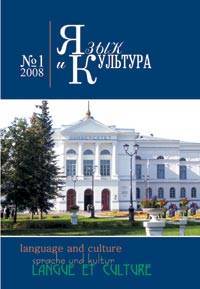The concept of an online bilingual Russian-English derivative dictionary installed into a parallel corpus (based on Russian derivative personal names with syncretic semantics and their English equivalents)
The paper focuses on the issue of word building being a cultural linguistic code of native speakers and discusses the urgency and the principles of developing a bilingual dictionary of Russian derivatives based on the Russian derivative words with syncretic semantics. The dictionary is going to be organized as a hypertext built into a parallel corpus. The derivative names of a person that belong to the syncretic zone of the Russian word formation are represented as culture-specific concepts requiring a special approach to the analysis of their semantics in the study of Russian as a foreign language and in the practice of translation. The authors chose the following word-building types to demonstrate the concept of the dictionary: 1) verbal nouns with the suffixes -un, -ok, -ach, -uh(a), -k(a), -ets, -ul(ya), -sh(a), -ush (a), -oh(a), -ax(a), -yag(a), -ak(a), -l(a), -yg(a); 2) adiectival nouns with the suffixes -ak, -аЛ, -к(а), -Л(а), -ds, -ush^), -yshk^), -ish, -ag^), ^g(a), -yk(a), -ul(ya); 3) nounal nouns with the suffixes -аЛ, -ап, -yag^), -un, -yuh^), -yush^). The reason behind the choice of these word-building types was that they are in the transitional zone between the two main word-building spheres, mutational and modificational, and combine the semantic processes that take place in these spheres. The dictionary is planned to be organized in such a way that a basic dictionary entry has a number of hypertexts related to it and forming a hierarchy, which makes it possible to include maximum information revealing various aspects of structural and semantic specificity of Russian syncretic derivatives based on the results of state-of-the-art research. The dictionary is planned to fulfil the explanatory function, as it not only answers the question how a particular Russian word is translated into English but also explains the reason for the word being translated in different ways. The dictionaries of the kind are capable of revealing the specificity of the national world picture for those who are not the native speakers of the language as well as serve as a basis for comparative linguistic, bilingual and cultural-linguistic research.
Keywords
производные имена лица синкретичной семантики, параллельный корпус, билингвальный словарь, электронный словарь, derivative personal names with syncretic semantics, parallel corpus, bilingual dictionary, online dictionaryAuthors
| Name | Organization | |
| Nagel O. V. | Tomsk State University | olna41@yandex.ru |
| Temnikova I. G. | Tomsk State University | irtemnikova@mail.ru |
References

The concept of an online bilingual Russian-English derivative dictionary installed into a parallel corpus (based on Russian derivative personal names with syncretic semantics and their English equivalents) | Yazyk i Kultura – Language and Culture. 2017. № 40. DOI: 10.17223/19996195/40/5
